|
|
|
Sort Order |
|
|
|
Items / Page
|
|
|
|
|
|
|
| Srl | Item |
| 1 |
ID:
095911
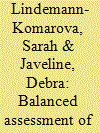

|
|
|
|
|
| Publication |
2010.
|
| Summary/Abstract |
Most analyses of civil society development in contemporary Russia tend to focus geographically on the city of Moscow and substantively on political elites, elections, and human rights violations. To the extent that the 141 million Russian citizens are mentioned, their experiences are usually represented by a handful of Muscovite human rights leaders. These leaders are certainly part of Russia's civil society, as are the many Russian citizens who have been victimized by the brutal war in Chechnya and other actions in the Caucasus. However, what of the other Russians? The story of the remaining 141 million matters and is yet untold.
|
|
|
|
|
|
|
|
|
|
|
|
|
|
|
|
| 2 |
ID:
095910
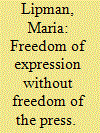

|
|
|
|
|
| Publication |
2010.
|
| Summary/Abstract |
One week after journalist Anna Politkovskaya was assassinated in Moscow, the Russian polling agency Levada Center asked her compatriots whether they had been aware of her work before the murder.1 Six percent said they had read her articles in which she investigated atrocities in Chechnya and other grim aspects of Russian life. Of this small group of readers, very few chose to join the rally the day after Politkovskaya's death at the hands of a contract killer.
|
|
|
|
|
|
|
|
|
|
|
|
|
|
|
|
| 3 |
ID:
095897
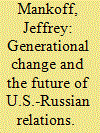

|
|
|
|
|
| Publication |
2010.
|
| Summary/Abstract |
The Cold War has now been over for nearly two decades. In that time, a whole generation has grown up, both in the United States and Russia, with no memory of the conflict that defined world politics for half a century. Not only do today's college students have no memory of even the final stages of the Cold War, many were not even born when the Soviet Union collapsed at the end of 1991. For an ever increasing share of young people in both countries, seminal events from the Cuban missile crisis to Ronald Reagan's stirring call to "tear down this wall" occupy approximately the same place in individual historical consciousness as the assassination of Archduke Franz Ferdinand or the Battle of Waterloo. That observation may seem obvious, but it has profound implications for the future course of relations between the two former Cold War rivals.
|
|
|
|
|
|
|
|
|
|
|
|
|
|
|
|
| 4 |
ID:
095907


|
|
|
|
|
| Publication |
2010.
|
| Summary/Abstract |
In any economy, oil and gas companies are tightly linked with the government. In petro-states such as Russia, they are so closely connected that they are sometimes indistinguishable. This symbiotic relationship is particularly strong in the global expansion of Russian energy corporations such as Gazprom, LUKOIL and Rosneft (see table), which is guided by a tangled web of commercial and political motives.
|
|
|
|
|
|
|
|
|
|
|
|
|
|
|
|
| 5 |
ID:
095906
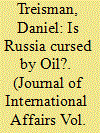

|
|
|
|
|
| Publication |
2010.
|
| Summary/Abstract |
Russia is often thought to be a classic case of the resource curse-the idea that natural resource wealth tends to impair democratic development.1 Some see the country as doomed to authoritarian politics by its enormous endowments of oil and gas. "Russia's future will be defined as much by the geology of its subsoil as by the ideology of its leaders," writes Moisés Naím, editor-in-chief of Foreign Policy magazine and former trade and industry minister of petroleum-rich Venezuela. "A lot of oil combined with weak public institutions produces poverty, inequality, and corruption. It also undermines democracy."2 New York Times columnist Thomas Friedman sees a close relationship between world commodity prices and the extent of liberty in resource-rich states: a higher oil price means less freedom. Friedman suggests that Russia, from Gorbachev to Putin, fits this relationship perfectly.
|
|
|
|
|
|
|
|
|
|
|
|
|
|
|
|
| 6 |
ID:
095905


|
|
|
|
|
| Publication |
2010.
|
| Summary/Abstract |
In the field of energy, Europe will be confronted with various risks in the next twenty years. Most notably, there is no clear alternative to fossil energy on a large scale with the possible exception of nuclear energy; yet few countries are able to pay for the large investment required by a nuclear industry. The need to ensure greater energy security and better regulation of energy supplies will turn energy policy into a much more politicized issue. Energy, already an important security concern, will continue to shape future military and political relations, especially if there is no other option other than oil and gas to satiate growing demand.
|
|
|
|
|
|
|
|
|
|
|
|
|
|
|
|
| 7 |
ID:
095901
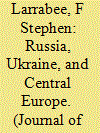

|
|
|
|
|
| Publication |
2010.
|
| Summary/Abstract |
Nine November 2009, marked the 20th anniversary of the fall of the Berlin Wall, effectively marking the end of the Cold War. It opened the way to the collapse of communism in Eastern Europe, the reunification of Germany, the disintegration of the Soviet Union, and the emergence of a new security order in Europe.
|
|
|
|
|
|
|
|
|
|
|
|
|
|
|
|
| 8 |
ID:
095909


|
|
|
|
|
| Publication |
2010.
|
| Summary/Abstract |
The financial turmoil originating from the U.S. subprime mortgage crisis hit Russia by early September 2008, prompting the Russian government and the Central Bank of Russia to undertake a set of speedy and concerted measures to soften the impact of the crisis. These initial measures supported the value of the ruble as ruble holders, domestic and foreign, switched to dollars. They also provided hard currency to major Russian banks and Russian big business (the so-called oligarchs) which had borrowed heavily from foreign banks for their expanding operations from 2000 to 2007.
|
|
|
|
|
|
|
|
|
|
|
|
|
|
|
|
| 9 |
ID:
095899


|
|
|
|
|
| Publication |
2010.
|
| Summary/Abstract |
When Vladimir Putin described the breakup of the Soviet Union several years ago as "the greatest geopolitical catastrophe" of the 20th century, his words triggered a strong reaction in the West and among Russia's neighbors. They sensed that the Russian president's words held not only nostalgia for the now-vanished great power but also hidden imperial ambitions. Indeed, Russia's political class of the late 20th and early 21st century is overcoming its post-imperial syndrome with difficulty. This phenomenon is not unique-many European empires faced the same problem in the 20th century. In Russia's case, the situation is compounded by the fact that the country's disintegration meant the loss of territories that had never been viewed as colonies but had been seen as a natural part of the country's historical and cultural core. For the first time in history, the Russian people have become a divided nation. After the Soviet Union ceased to exist, 25 million ethnic Russians found themselves living outside the Russian Federation, which could not but have an impact on the policies of Moscow and the other newly independent states.1 At the same time, Putin's words also carried a deeper meaning that few people noticed.
|
|
|
|
|
|
|
|
|
|
|
|
|
|
|
|
| 10 |
ID:
095903


|
|
|
|
|
| Publication |
2010.
|
| Summary/Abstract |
Ukraine faces a number of challenges, including a deep economic crisis and a tumultuous political system. These problems, however, only underscore the importance of continued U.S. engagement with Ukraine. The causes of European stability and prosperity are best served by a Ukraine that is democratic, secure in its borders, and integrated into European and Euro-Atlantic institutions. This has been the U.S. position since Ukraine's independence in 1991. In addition to its internal challenges, Ukraine faces an external challenge: Russia. Recent Russian actions suggest that Moscow still considers Ukraine to be within its sphere of influence. Furthermore, Russia's conflict with Georgia in August 2008 demonstrates that Moscow is willing to use a wide variety of tools, including military force, to establish and enforce its sphere of influence. Such attitudes threaten to return Europe to the destructive balance of power politics of its past, rather than promote a peace in the region based on the right of sovereign nations to determine their own future. Ukraine has made a choice to be a part of Europe by undertaking a number of reforms in order to become a truly independent and democratic country. In the interest of greater European stability and prosperity, and in recognition of Ukraine's positive engagement, the United States must continue its efforts to assist Ukraine on the path to democracy.
|
|
|
|
|
|
|
|
|
|
|
|
|
|
|
|
| 11 |
ID:
095908


|
|
|
|
|
| Publication |
2010.
|
| Summary/Abstract |
By January 1992, the Soviet Union had dissolved and the new Russian government had liberalized prices for most goods and services, ushering in a new Russian economy. In 2010, this economy turned eighteen years old and has, in Russian terms, come of age. In this article, we assess the current state of the Russian economy and its long-term prospects. Where is the Russian economy today, and where is it heading?
|
|
|
|
|
|
|
|
|
|
|
|
|
|
|
|
|
|
|
|
|